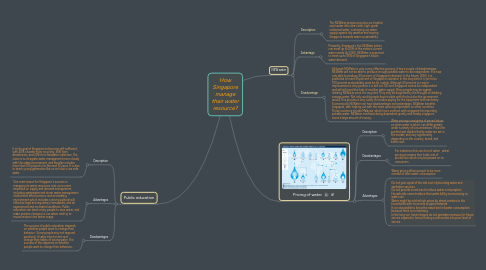
1. Public education
1.1. Description
1.1.1. It is the goal of Singapore to become self-sufficient, with 40% of water from recycling, 30% from desalination, and 20% from rainwater collection. The vision is to integrate water management more closely with the urban environment, and the plan includes more than 100 projects for the next 10 years. It is also to teach young generation like us on how to use safe water.
1.2. Advantages
1.2.1. One main reason for Singapore's success in managing its water resources is its concurrent emphasis on supply and demand management, including wastewater and storm water management; institutional effectiveness; and an enabling environment which includes a strong political will, effective legal and regulatory frameworks, and an experienced and motivated workforce. Public education can teach many people to save water, and make positive changes to use water. and try to reuses reduce their water usage.
1.3. Disadvantages
1.3.1. The success of public education depends on whether people want to change their behavior . Some people may not respond positively .It takes time to train and change their habits of saving water. The success of this depends on whether people want to change their behaviour.
2. Pricing of water
2.1. Description
2.1.1. Water pricing is assigning of prices/values on clean water in which can differ greatly under a variety of circumstances. Prices for purified and distilled bottle water are set in the market, and vary significantly depending on the country, brand, and bottle size.
2.2. Disadvantages
2.2.1. For industries that use a lot of water , water pricing increases their total cost of production which may be passed on to consumers .
2.3. Advantages
2.3.1. Water pricing allows people to be more mindful of their water consumption
2.3.2. Do not give signal of the real cost of providing water and sanitation services Do not provide incentives to reduce water consumption Households cannot reduce their water bill by economising on water use Water might be sold at high prices by street vendors to the households with no access to piped network It is not possible to know the exact level of water consumption because there is no metering In the long-run, fixed charges do not generate revenues for future service expansion, hence locking communities into poor level of service
3. NEW water
3.1. Description
3.1.1. The NEWater process recycles our treated used water into ultra-clean, high-grade reclaimed water, cushioning our water supply against dry weather and moving Singapore towards water sustainability.
3.2. Advantage
3.2.1. Presently, Singapore's five NEWater plants can meet up to 40% of the nation’s current water needs. By 2060, NEWater is expected to meet up to 55% of Singapore’s future water demand.
3.3. Disadvantage
3.3.1. Although NEWater is very a very effective process, it has a couple of disadvantages. NEWater will not be able to produce enough potable water to be independent. It is now only able to produce 30 percent of Singapore's demand. In the future, 2060, it is predicted to meet 55 percent of Singapore’s demand. In this long time it is yet to be 100 percent and probably wont be for a while. Although 50 percent is a major improvement is very positive it is still not 100 and Singapore cannot be independent and will still need the help of another water supply. Many people may be against drinking NEWater since it is recycled. They may be disgusted by the thought of drinking sewage water. Not only would people have trouble with this but also the government would. This process is very costly it includes paying for the equipment and machinery. Economically NEWater can have disadvantages and advantages. NEWater benefits singapore, with helping out with the need op being dependent on other countries. These countries include Malaysia, which has a contract with singapore for importing potable water. NEWater minimizes being dependent greatly and hereby singapore saves a large amount of money.

